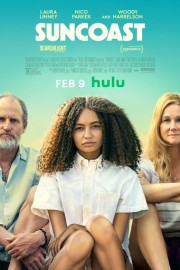Suncoast
Only another caregiver can truly understand what a caregiver is going through. Doris sees right through Paul, and Paul sees right through Doris. He knows that she is not prepared for the feelings she is going to experience when her brother is truly gone, and she sees that his fundamentalist desire to have a stranger live, despite not knowing them, might be coming from a genuine place, but is disrespectful to the paths that others have to face when the death of a loved one is in their hands.
“Suncoast” is a coming-of-age story on the surface, but it’s ultimately about the ways in which different people mask their grief when their efforts to be a caregiver for a loved one are either near the end, or come to a close. Writer-director Laura Chinn is writing from a personal place- the death of her own brother after years of being kept alive in a vegetative state- but there’s also smart social commentary on how the pro-life movement can exacerbate the pain people feel when all they are trying to do is do what is best for their loved ones when there’s not much left to do.
The story takes place during the firestorm of the final weeks/days of the Terri Schaivo case in 2005. I remember when that became a national story, with fundamentalist Christians taking on the cause for Schaivo- who had been declared brain dead since 1998- to be kept alive, even in a vegetative state as an offshoot of their anti-abortion crusade. At the time, I believe I sided with her husband, Michael, in thinking he had the right to have her feeding tube removed, and I still do, but I also understand the position of her parents, whom were just not ready to let go of their daughter. Death is a finality that caregivers can think they’re ready for since it feels inevitable, but when it happens, all they can do is grieve. The moral questions that arose from the Schaivo case do not supercede the emotional weight the people at the center of it- Terri’s husband and her parents- experience, even if those whom protested the removing of her feeding tube think otherwise.
In “Suncoast,” Doris (Nico Parker) and her mother, Christine (Laura Linney) have been caring for Max for several years. As such, Doris has not had an easy, normal childhood. Going to a Christian school because her mother fears school shootings, Doris has been as much a caregiver as her working mother has. Now, they are moving Max into hospice care for the end of his life. It just happens to be the same facility Schaivo is at, so they are bombarded with the frenzy at their doorsteps. As Christine tries to tend to Max, Doris starts to branch out, and try to become friends with some of her classmates. She needs a distraction, as well as an opportunity to have a life away from her family. When it matters most, though, will she be there? Is it important if she is?
The coming-of-age arc of Chinn’s film is as predictable as you’d expect, with very little new territory covered. What elevates this film into an absolutely beautiful story is how we chart Doris as she is faced with the emotional truth of Max finally passing, whether that’s through her mother’s manipulations or the friendship she strikes up with Paul (Woody Harrelson), one of the activists outside protesting the decisions in the Schaivo case. Parker is wonderful in this film as we see her taking in the nuances of the Schaivo decision, and seeing how it reflects her own life, and how her actions show her own struggles, even if she thinks she is ready. She won’t be, and that’s ok. She did the best she could. When we find ourselves responsible for the ways in which a loved one may or may not end their lives, we want to be sure they know we’re doing the best we can…and we want to make sure of that in our own minds, as well.










